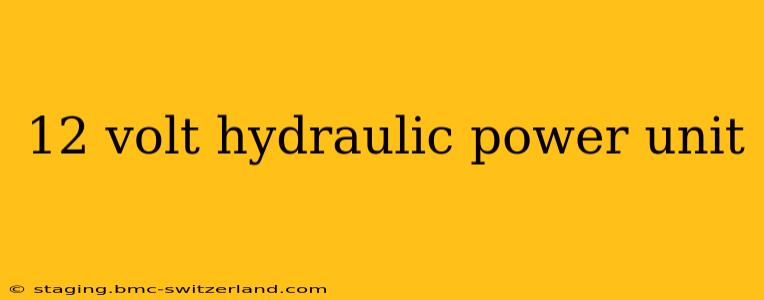A 12-volt hydraulic power unit (HPU) is a compact and self-contained system designed to provide hydraulic power for various applications where a larger, mains-powered system isn't practical or necessary. These units are ideal for portable tools, small machinery, and other applications requiring controlled hydraulic force in a mobile or limited-space environment. This guide will explore the intricacies of 12-volt HPUs, answering common questions and providing valuable insights.
What is a 12 Volt Hydraulic Power Unit?
A 12-volt hydraulic power unit is essentially a miniature hydraulic system consisting of a pump, reservoir, control valves, and often a motor, all integrated into a single, often portable unit. The 12-volt power source, typically a battery, drives the pump, which generates the hydraulic pressure needed to actuate hydraulic cylinders or motors. These systems offer a significant advantage in situations where a traditional mains-powered system isn't feasible due to size constraints, power availability, or portability requirements.
How Does a 12 Volt Hydraulic Power Unit Work?
The operation is straightforward: the 12-volt motor powers a hydraulic pump. This pump draws hydraulic fluid from the reservoir and increases its pressure. This pressurized fluid is then directed through control valves to hydraulic actuators (cylinders or motors), performing the desired work. Once the work is complete, the fluid returns to the reservoir, completing the cycle. The efficiency and power of the system depend on the pump type, motor specifications, and the overall design of the HPU.
What are the Different Types of 12 Volt Hydraulic Power Units?
Several factors differentiate 12-volt hydraulic power units. These include:
- Pump Type: Gear pumps are common due to their simplicity and affordability, while vane pumps offer higher efficiency at higher pressures. Piston pumps provide the highest pressure but are typically more complex and expensive.
- Reservoir Capacity: The size of the reservoir determines the operational duration before needing a refill. Larger reservoirs allow for longer operation but increase the overall size and weight of the unit.
- Flow Rate: The flow rate (gallons per minute or liters per minute) dictates how quickly the hydraulic actuator can move. Higher flow rates generally mean faster operation but may require a more powerful motor.
- Pressure: The maximum pressure the HPU can generate is a critical factor, determining the force the hydraulic actuators can exert.
What are the Applications of a 12 Volt Hydraulic Power Unit?
The versatility of 12-volt HPUs makes them suitable for a wide range of applications, including:
- Mobile Hydraulic Tools: Think of portable hydraulic jacks, log splitters, and even small hydraulic presses.
- Agricultural Equipment: Small-scale agricultural machinery can benefit from the compact nature and portability of these units.
- Construction and Maintenance: Certain tasks requiring controlled hydraulic power in tight spaces could use a 12-volt HPU.
- Automotive Repair: Specific automotive repair tasks may benefit from the compact size and portability.
- Robotics and Automation: Smaller robotics projects may find 12-volt HPUs an ideal solution.
What are the Advantages of Using a 12 Volt Hydraulic Power Unit?
- Portability: Their compact size and 12-volt power source make them easily portable.
- Ease of Use: Many 12-volt HPUs are relatively simple to operate.
- Cost-Effectiveness: Compared to larger hydraulic systems, they can be more affordable.
- Efficiency: Modern 12-volt HPUs can achieve surprisingly high efficiency for their size.
- Safety: Properly designed and used, they present a relatively safe operation compared to more powerful systems.
What are the Disadvantages of Using a 12 Volt Hydraulic Power Unit?
- Limited Power: Compared to larger hydraulic systems, they have significantly lower power output.
- Lower Pressure Capacity: The maximum pressure is significantly lower than larger systems.
- Battery Dependency: Their operation relies on a 12-volt battery, which needs regular charging or replacement.
- Limited Flow Rate: The flow rate is generally lower compared to mains-powered systems.
- Heat Generation: Smaller units can be more prone to overheating under heavy use.
How to Choose the Right 12 Volt Hydraulic Power Unit?
Selecting the appropriate 12-volt HPU depends entirely on your specific application. Consider these factors:
- Required Pressure and Flow Rate: Determine the pressure and flow rate needed to actuate your hydraulic cylinders or motors effectively.
- Duty Cycle: How long will the unit be operated continuously? This influences the size of the reservoir and the motor's capacity.
- Application Environment: Will the unit be used indoors or outdoors? This impacts the design and robustness requirements.
- Budget: The cost of 12-volt HPUs varies considerably based on features and specifications.
By carefully considering these factors, you can choose the most suitable 12-volt hydraulic power unit for your specific needs. Remember to always follow the manufacturer's instructions for safe and efficient operation.
